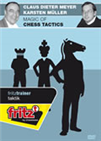Delightful possibilities
Vladimir Nabokov, besides giving chess a central role in his literary works, has a special quality which deeply connects him with the royal game: his technical knowledge was so deep and his passion so exemplary that he spent a vast amount of time composing high-quality chess studies.
Chess is conspicuously spread throughout his novels, short stories and poems, and is dealt with more explicitly in his memoir Speak, Memory. So, when he was already a well-known writer worldwide, in 1962 — he had published Lolita in 1955 — he was interviewed by the BBC. Naturally, chess came up in the conversation. In this case, Nabokov was the one linking chess with fiction and subjectivity.
Excerpt from the BBC interview (1962)
 Chess Tactics are the art of combat command. When tactics dominate concrete action is required immediately in order to put a plan into practice or to grab an opportunity. However in complicated positions and with determined resistance basic tactics are often insufficient and intuition, imagination and precision are necessary.
Chess Tactics are the art of combat command. When tactics dominate concrete action is required immediately in order to put a plan into practice or to grab an opportunity. However in complicated positions and with determined resistance basic tactics are often insufficient and intuition, imagination and precision are necessary.
You say that reality is an intensely subjective matter, but in your books it seems to me that you seem to take an almost perverse delight in literary deception.
The fake move in a chess problem, the illusion of a solution or the conjuror's magic: I used to be a little conjuror when I was a boy. I loved doing simple tricks — turning water into wine, that kind of thing; but I think I'm in good company because all art is deception and so is nature; all is deception in that good cheat, from the insect that mimics a leaf to the popular enticements of procreation.
Do you know how poetry started? I always think that it started when a cave boy came running back to the cave, through the tall grass, shouting as he ran, "Wolf, wolf," and there was no wolf. His baboon-like parents, great sticklers for the truth, gave him a hiding, no doubt, but poetry had been born — the tall story had been born in the tall grass.
You talk about games of deception, like chess and conjuring. Are you, in fact, fond of them yourself?
I am fond of chess but deception in chess, as in art, is only part of the game; it's part of the combination, part of the delightful possibilities, illusions, vistas of thought, which can be false vistas, perhaps. I think a good combination should always contain a certain element of deception.
[Pictured: Nabokov's statue in Montreux, Switzerland | Photo: Николай Максимович]
Usually reticent to giving interviews, Nabokov agreed in 1975 (he was born in 1899) to have a one-hour talk with the recognised French journalist Bernard Pivot, who hosted the cultural programme Apostrophes. The writer responded — in French — to a number of questions regarding his work and ideas; chess came up rather late in the interview, but they stayed on topic for quite a while.
 On this DVD GMs Rogozenco, Marin, Müller, and IM Reeh present outstanding games, stunning combinations and exemplary endgames by Alekhine. And they invite you to improve your knowledge with the help of video lectures, annotated games and interactive tests
On this DVD GMs Rogozenco, Marin, Müller, and IM Reeh present outstanding games, stunning combinations and exemplary endgames by Alekhine. And they invite you to improve your knowledge with the help of video lectures, annotated games and interactive tests
Vladimir and Vera Nabokov (Montreux, 1969) | Photo: Giuseppe Pino
Transcript from the interview in Apostrophes (1975)
You have written this marvellous novel The Defence. Are you a very good chess player? And, talking about chess, what do you think about Fischer's attitude?
I was a pretty good chess player. Not a "gross" master, as the Germans say...I was not a grandmaster. [...] I was a pretty good club player, capable of setting a trap to a stunned champion. What I've always liked about chess are the traps, the hidden combinations. That's why I abandoned the competition and devoted to the composition of chess problems. I'm certain that there exists a close link between some of the mirages in my prose and the fabric — both bright and obscure — of chess problems, magical enigmas, each one of them the product of one thousand and one nights of insomnia. I love to compose the problems known as "suicidal", in which White forces Black to win.
Yes, Fischer is a strange being, but there's nothing abnormal in a chess player not being normal. It is the case of the great player Rubinstein, at the beginning of the century — from the mental hospital where he lived, an ambulance drove him every day to the coffee-house where the tournament took place and then returned him to his black compartment after the game. He did not like to see his adversary, but an empty chair on the other side of the board irritated him even more; therefore, they used to put a mirror in front of him, in which he saw his reflection, or perhaps the real Rubinstein.
But Fischer is a case for psychoanalysis...
No, no, he is simply a great player who has small manias.
Nabokov will always be remembered for his literature, but for us, chess fans, he will also be memorable due to his passion for the game. He had the talent to properly extol the game in all its vastness, a legacy that should not be left aside.
Translation from Spanish: Carlos Colodro
Links
























